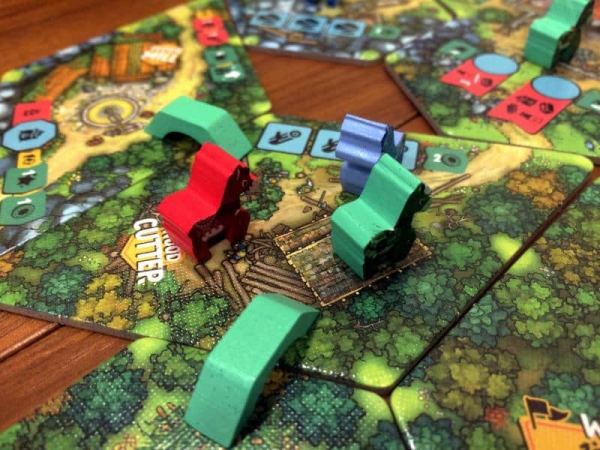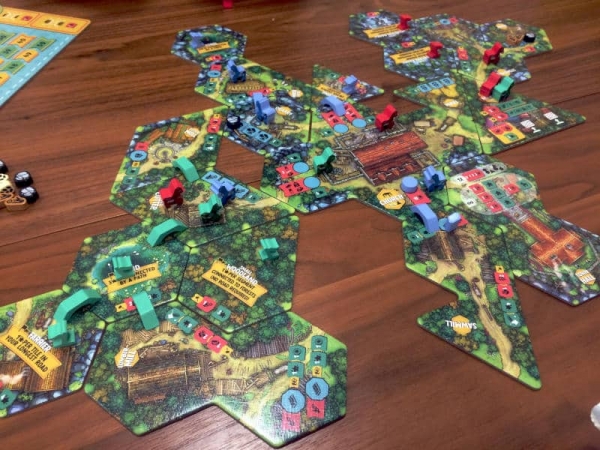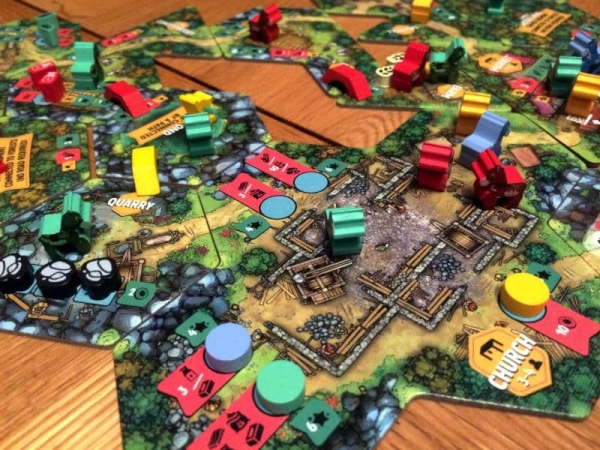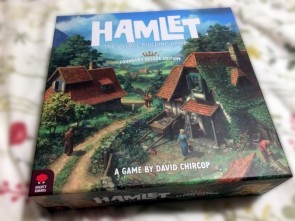It was a sleepy village in the middle of the countryside. The residents were hard-working, cutting down trees for wood and digging up rocks to construct new buildings and planting and harvesting grains to feed the population. Over time, more people were attracted to the village as it grew and grew. Eventually, it was time to build a church in this little Hamlet: The Village Building Game by David Chircop from Mighty Boards.
Yes, you've heard right. You're all working together to grow your village. Everything you produce or build can be used by everyone else around the table. It all sounds rather harmonious and lovely - and it probably would have remained as such, if it hadn't been for the hamlet's residents' desperate desire to build a church.
The term "hamlet", as the rulebook tells us, refers to "a small village without a church". So by building one, your little village will take a step up in the world - or at least that seems to be what the people of the village believe is going to happen. It all sounds like greed to me, to be honest - and it's where all of the trouble starts.
Competitive Workers
Hamlet is a competitive game, even though what I said in the introduction is true: you do share resources and buildings. You even share roads, but ultimately everyone is in it for themselves. The player with the most points at the end of the game wins. You get points for building roads, new action spaces or other locations, for delivering goods from the village to the market and, of course, for building parts of the new church everyone is so excitedly talking about.
There are two problems though, at least at the start: you have one worker meeple and one donkey meeple. Workers allow you to carry out actions, while donkeys allow you to transport resources from the locations where they were produced to the place where you need to consume them. So one worker won't allow you to do much on your turn and the lonely little donkey won't be able to carry goods very far.
Luckily, the village is quite small at the beginning. A single donkey is enough to get everything from one end of the village to the other. A single worker is also plenty, because there is only so much you can do at the start of the game.
As the village grows, the situation changes. It doesn't take long and you will need another donkey. You also want to get at least one more worker out as quickly as possible. After all, the more actions you can take on your turn, the more you can achieve. That includes doing things that give you victory points.
Standard Opening
In fact, "buying" your second and third workers is basically a must. That's why the first five turns of Hamlet will basically be the same. First, you do some work to get two coins. Second, you buy your second worker for five coins. Third, you send both meeples to work to get four coins. Fourth, you work some more for another four coins. Fifth, you get your third worker for seven coins.
Those first five turns might be slightly different, depending on player count and what others are doing, but unless you have three workers on turn five or six, you're going to lag behind the others very quickly. I suppose, if nobody goes for workers early on, you will be all right, but if you've played Hamlet at least once, you will most definitely go for more workers, because they give you the additional actions to allow you to gain victory points.
That is, unfortunately, my first issue with Hamlet. If everyone plays to maximize points, they will, without a doubt, get additional workers as quickly as possible. It's not really a choice for anyone. It's a must. That means for the first five or so rounds of the game, you don't really make any real decisions as a player. All you can choose from is how you get the money and at the beginning of the game, it's most likely working in the quarry or on the farm or cutting some wood. You might be forced to beg at the church and maybe you can deliver some goods to the market, but that's about it. Ultimately though, it's not a real choice. There isn't really any strategic or tactical thinking involved.
 Everyone gets their own donkeys and can build roads
Everyone gets their own donkeys and can build roads
More Options
Once you have three workers, you don't necessarily need the fourth straight away, if at all. You have enough options on your turn and can start to play more competitively. There usually is little anyone can do to slow down or interfere with you, depending on the situation.
With three workers, you will start to build new buildings and grow the village. You will deliver goods to the market and as a result, start to score more points. It feels like you're building an engine and that the engine is slowly stuttering to life.
The engine-building element in Hamlet is actually really interesting. You're not really running your own engine. You're relying on resources to be available and that nobody used them before your turn. However, having three actions on your turn usually gives you plenty of options.
Saying that, you do have to plan a little ahead. Sometimes you can't do everything on your turn, even with those three meeples at your disposal. If you can plan out your next two turns though, you should be fine. As I said, there usually isn't much other players can do to stop you.
In fact, when someone builds a new dairy farm, for example, you can go there to make milk. Some else can then use your milk to do what they need it for, but you will still get a bonus. It's almost positive player interaction and reminds me a little bit of Brass: Birmingham. Maybe you made the milk for yourself to use on your next turn, but if someone does take it, at least you get something out of it. Also, if you plan well, you can make the milk and ensure that it's still there when the game comes back around to you.
Hamlet Building
Another big part of Hamlet is growing the village, by adding tiles. There are certain conditions as to how and where you can place these new buildings, but it's fun to work out where best to add them so that you can reach them easily or so that you can score the most points. It's a bit like Carcassonne in that respect.
Sometimes a new tile can only be placed, so that it is not connected by road to any other tile. That's where you or another player can help. One of the actions you can do is to build so-called paths or bridges, depending on which terrain you build them in. Ultimately, they function like the roads already printed on the tiles. Everyone can use the paths and bridges you built, but only you will get points for them at the end of the game.
The game even encourages you to create really long roads that lead away from the village's centre. It sort of reminded me of the longest road in Catan, except that there isn't just one player who gets points for the longest road. Instead, everyone scores their own longest road at the end of the game.
The last thing you will do in Hamlet is to build the church. I say it's the last thing, because, well, it's something you'll do right towards the end. The points you get for contributing a section of the church are usually less than you can achieve by adding a building tile to the village, even if you include the bonus for the two players who built the most or second-most sections of the church. It's very expensive to build a church section. So, yes, everyone will leave the church to last and try and score as much as possible in the meantime.
 The hamlet is growing
The hamlet is growing
A Sleepy Village
That leads to another issue I have with Hamlet: it outstays its welcome. There is no race to be the first to complete the church. Instead, everyone focuses on doing everything else first. The game really only ends when there are no more village and market tiles left to score and everyone has got their donkeys and roads out. Even then it's going to take a while to get the resources or money together to complete the church.
Hamlet takes a little while to get going, which is fine and feels like it's intentional. You all start in a sleepy village and slowly build your resource-making engine. As I said, the only issue I have is that you're forced to get your workers out as soon as possible. However, putting that to one side, having a game start slowly isn't an issue for me.
When your engine is finally running, Hamlet is actually a lot of fun. You're starting to compete with other players a little and get excited about building the next tile or delivering a nice selection of goods to the market. You're pleased when your plan comes together and you've worked out the best combination of actions to achieve your goal.
However, then Hamlet just keeps going. The village grows, more donkeys appear on the map, the market tiles run out and you're still playing. After about an hour and a half, you've had enough and want the game to end. You actually just want to finish now and calculate everyone's score. Building the church has become a goal that everyone has forgotten about, as they were busily growing the village into a small town.
Hamlet is Not the Scottish Play
I also often didn't feel I had much agency in the game. It was much more about tactics than strategy. You usually don't have enough money to afford a building tile you really want, so you just go for the free one and do the best you can with it. Similarly, you look at the market tiles and see what resources are needed to get points. You then spend your turn producing what's necessary. It feels very reactive and very little proactive. So while your engine is purring nicely, you just respond to whatever the game throws at you.
When I first saw the campaign for Hamlet, I got really excited. Here was a game with shared resources, reminiscent of Brass: Birmingham, a tile laying element that reminded me of Carcassonne, a rather simple set of rules, gorgeous artwork and the obligatory metal coins that came with the deluxe edition. In my imagination, I could see myself playing this game with my family as well as my games group a lot and having a lot of fun, but unfortunately, somewhere along the lines, Hamlet didn't live up to my expectations.
I really wanted to love this game. I kept thinking that maybe we were just playing it wrong. Maybe we should all have focused on completing the church, but there were just more points to be had in other places. If the game had a fixed number of rounds, maybe that would work. If new workers would just be given to you for free every so often, it might also be better. You would potentially end up with more money to help with building the church. I kept trying and trying to really make this game work for us, but I had to give up, unfortunately.
 Building the church is a slow process and not as glamorous as you had hoped
Building the church is a slow process and not as glamorous as you had hoped
Leave the Church in the Hamlet
I know the publisher has released a document with a special setup for when you play the game for the first time, which says that "Hamlet is [...] open ended, and plays a little bit like a sandbox." So they accept that it can take a while to play. The publisher also says that this First Game Scenario is supposed to be an "accelerated setup" which I think is a nod to how slow Hamlet can feel at the beginning.
I don't know what went wrong, but somewhere along the path the beautiful Hamlet just wasn't as pretty as the brochure had promised. Maybe wanting to build a church was just one step too far.
 Games
Games How to resolve AdBlock issue?
How to resolve AdBlock issue? 


















